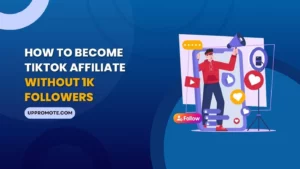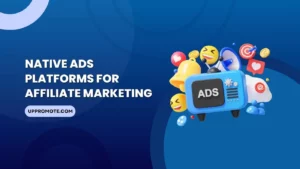Affiliate marketing is now one of the most effective ways for brands to boost sales and reach more customers. When starting an affiliate program, it’s important to understand the difference between affiliate codes and affiliate links in order to track and manage your campaign effectively.
While both are used to identify and attribute sales to affiliates, they operate in distinct ways.
In this guide, we’ll break down what affiliate codes are and how they set themselves apart from affiliate links. We’ll also share real examples of how affiliates use these codes and tips to help you get the most value from affiliate codes in your program.
Potential Revenue with Affiliates (UpPromote)
Estimate the potential revenue when you recruit affiliates: comparing Current Business and Business + UpPromote.
Estimated Impact
Quickly visualize how affiliates can boost your orders and revenue.
Revenue Comparison: Current vs. with UpPromote
The chart illustrates relative revenue growth comparing two scenarios: organic sales vs. organic + affiliate-driven sales.
- Affiliate traffic quality is equal to your current traffic.
- AOV and Conversion Rate remain stable.
- Does not account for churn, refunds, or potential upsell/cross-sell.
To make things easier, use a reliable affiliate marketing platform. Check out UpPromote—the top trusted Shopify affiliate solution for growth, rated 4.9/5 with over 4,000 reviews. The app lets you automatically generate affiliate codes, customize a unique one for each partner, and track results in real time.
Join 115,000+ UpPromote users and start creating exclusive affiliate codes that excite your partners and convert more customers.
What Is An Affiliate Code?
An affiliate code is a unique alphanumeric sequence assigned to an affiliate when they join a brand’s affiliate program. The code may consist of the affiliate’s name or brand combined with numbers or special characters.
The affiliate marketer can share this code with their audience. When customers use the code at checkout, they get a discount, and the affiliate earns commissions.
For example, Public Desire, a trend-driven online fashion and footwear brand for women, partners with many affiliates and influencers to promote their collections. They usually give their partners exclusive discount codes to share with followers and help drive sales.
One of their affiliates is Grace Gibbons, and her affiliate code is GRACE15. If someone enters this code while placing an order, they get 15% off, and she will receive a commission for this completed purchase.

How do Affiliate Codes Work?
When starting an affiliate program, tracking via affiliate discount codes is one of the most popular tracking methods you can use. With the help of affiliate tracking software, generating exclusive discount codes for your partners can become quick and easy.
Here’s a breakdown of how affiliate codes work:
- Affiliates sign up for your program.
- You create and assign each affiliate a unique coupon code.
- Affiliates promote your product and share their code.
- Customers use the code at checkout to get a discount.
- Your tracking system identifies which affiliate referred the customer.
- You pay the affiliate a commission for the completed sale.
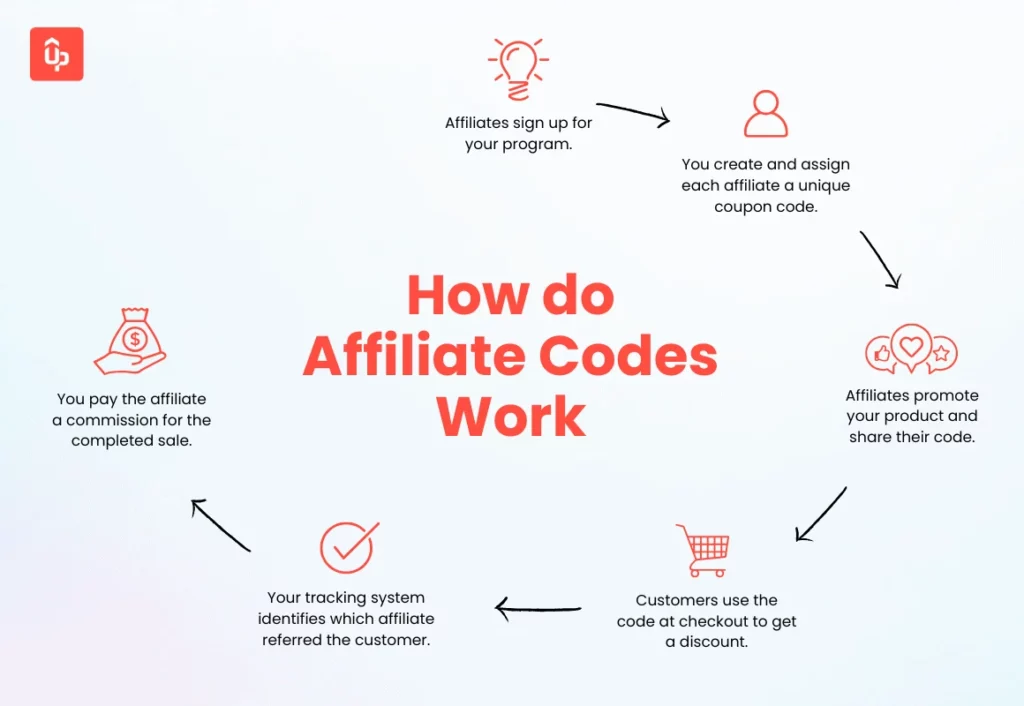
Key Differences Between an Affiliate Discount Code and an Affiliate Link
In affiliate marketing, two common ways used to track sales are affiliate links and affiliate discount codes. Affiliates usually share these with their audience. People often see them when browsing the web or scrolling through social media:
- Affiliate links are trackable URLs that direct users to a brand’s website. When someone clicks the link and makes a purchase, the affiliate earns a commission.
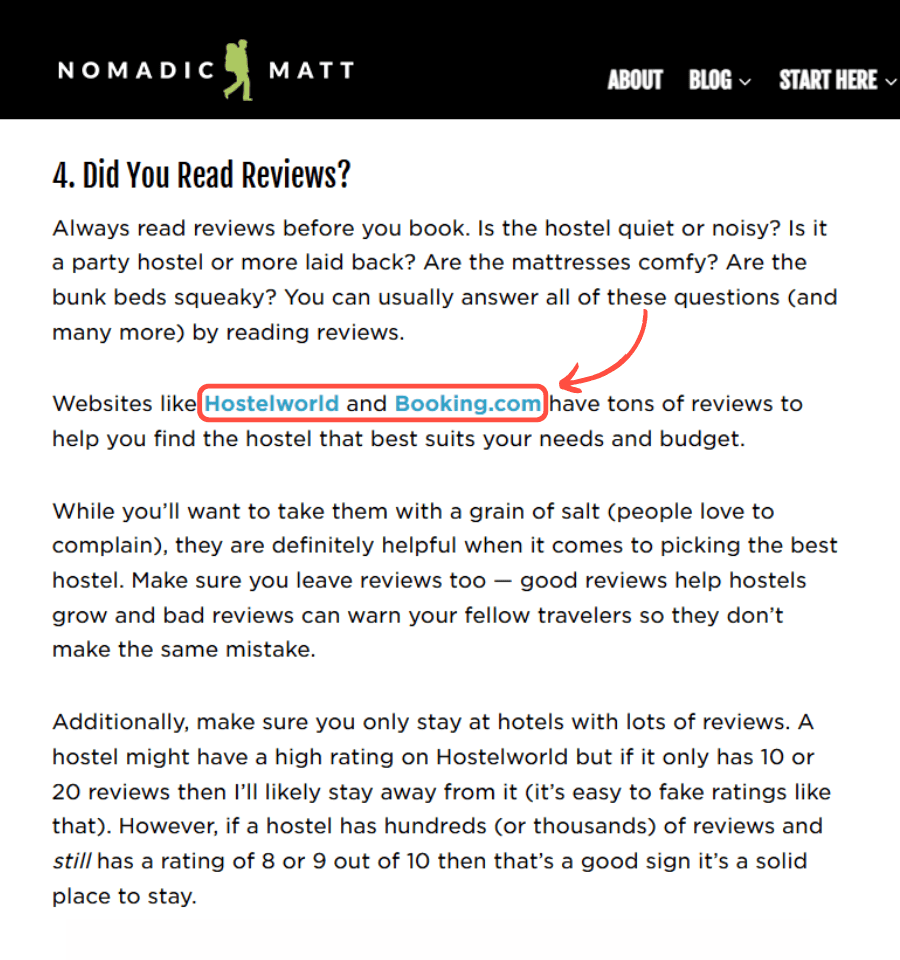
- Affiliate discount codes are unique codes that affiliates share with their followers. When customers enter the code at checkout, they often receive a discount, and the affiliate gets credit for the sale.
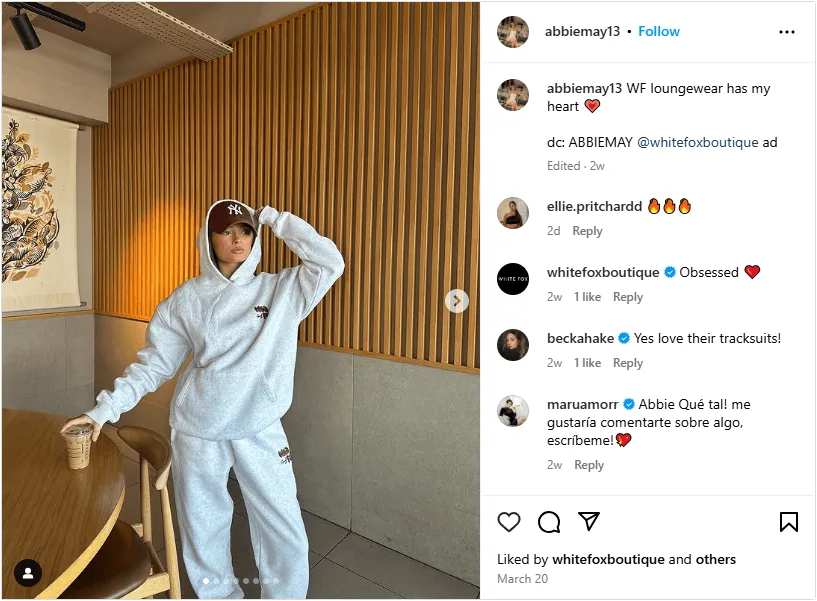
Both methods track referrals, but they work differently. Each has its own advantages.
Take a look at the table below to see how an affiliate code differs from an affiliate link:
| Feature | Affiliate Code | Affiliate Link |
| Format |
|
|
| Tracking |
|
|
| Cross-device tracking |
|
|
| Cookie duration |
|
|
| Affiliate appeal |
|
|
| Ease of use |
|
|
| Best for |
|
|
As you can see, the significant benefits of affiliate codes include:
- Effective in offline or audio-based marketing channels where sharing links is impractical. For instance, podcast hosts can easily mention a memorable code on air—something that would be difficult with a complex URL.
- Useful on social media platforms that restrict clickable links. Useful on social media platforms that restrict clickable links. Networks like Instagram, TikTok, and some Facebook formats limit external links. This is especially true for users without business accounts or large followings.
- Cookie-free and unaffected by browser limitations. Unlike affiliate links, which depend on cookies that may expire, get blocked, or be deleted, affiliate codes work regardless of these limitations. Affiliate codes trigger instant attribution at checkout. This ensures affiliates still get credited even if the customer clears their browsing data, shops from multiple devices, or uses browsers or extensions that block tracking cookies.
That said, affiliate links have their own advantages. They offer a smooth experience for customers, as they don’t need to remember or enter anything manually. This makes them ideal for blog posts and product reviews, where direct links to specific items make shopping easier and more convenient.
Many brands today combine both approaches to track affiliate sales more accurately. This also gives affiliates the flexibility to choose the method that works best for their content and where they share it.
How Affiliates Use Affiliate Codes to Promote Your Brand (+Real-world Examples)
You can work with various types of affiliates to build a diverse team and increase your chances of driving more sales. However, each type of partner may use affiliate codes differently, depending on their platform and audience.
Knowing how your affiliates use codes helps you support their promotions. This way, you can improve your campaign results.
Bloggers
Bloggers are people who share helpful articles, reviews, or how-to guides on their own websites. They often write about topics they enjoy and attract readers with similar interests.
When joining an affiliate program, they help raise awareness about the brand through their content and naturally include affiliate codes within their blog posts.
For example, Nomadic Matt is a renowned travel blogger. He regularly posts helpful tips, guides, and resources for travelers on a shoestring budget.
He often references brands that sell travel gear, booking platforms, and insurance providers. By weaving in personal experiences and relaxed advice, he promotes these products in a way that truly resonates with his readers. He sometimes includes exclusive discount codes from brands in his articles, which may look like this:
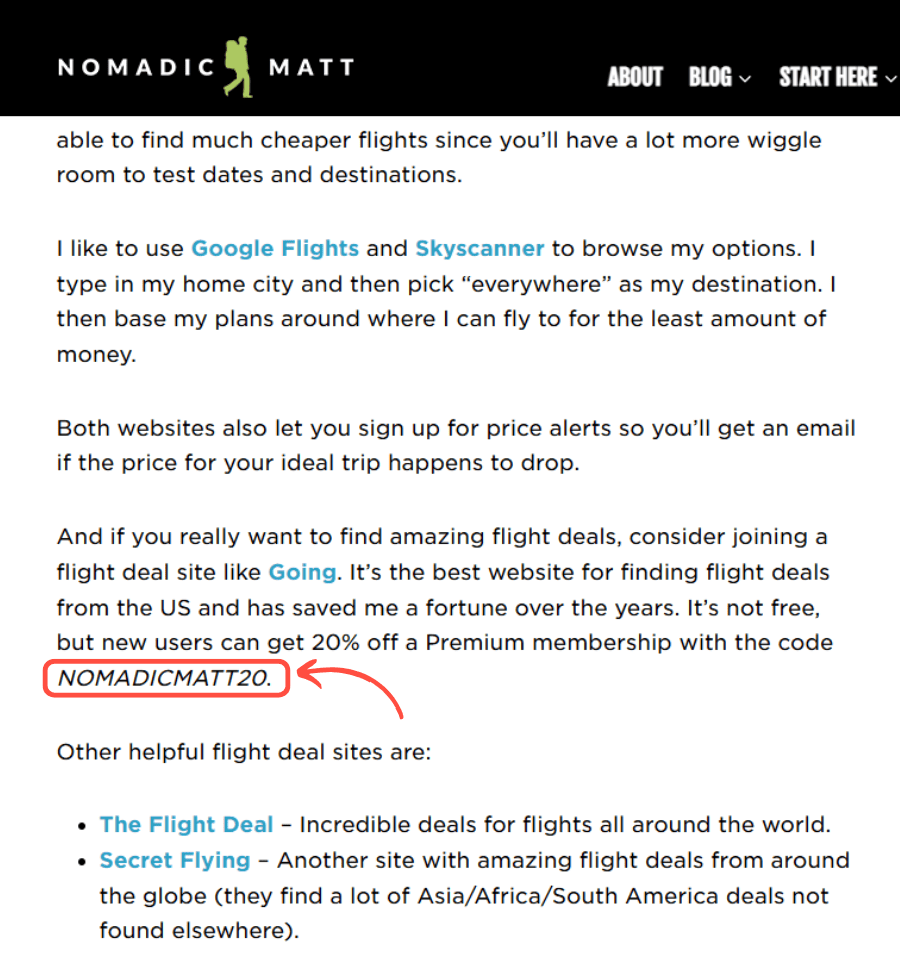
Social Media Influencers
Social media influencers are people with lots of followers on platforms like Facebook, Instagram, TikTok, and X. They often share eye-catching videos, photos, and live streams to keep their audience interested and engaged.
Some social media platforms, such as TikTok and Instagram, limit the use of direct affiliate links, especially in captions or video descriptions. Because of this, affiliate codes have become a great alternative for influencers to share with their followers.
Influencers often use creative ways to share these codes:
- Stories: Influencers share codes in stories using the “swipe up” feature or pin them to highlight stories on their profile.

- Livestreams and videos: Creators say codes aloud as they show products. They also display the code on screen during the video.

- Posts: Influencers add affiliate codes to captions of image or video posts, typically along with a short review or personal experience, to make the promotion feel more authentic.

- Profile bios: Many influencers include their most-used affiliate codes in their social media bios. This way, their followers can find them easily whenever they want.
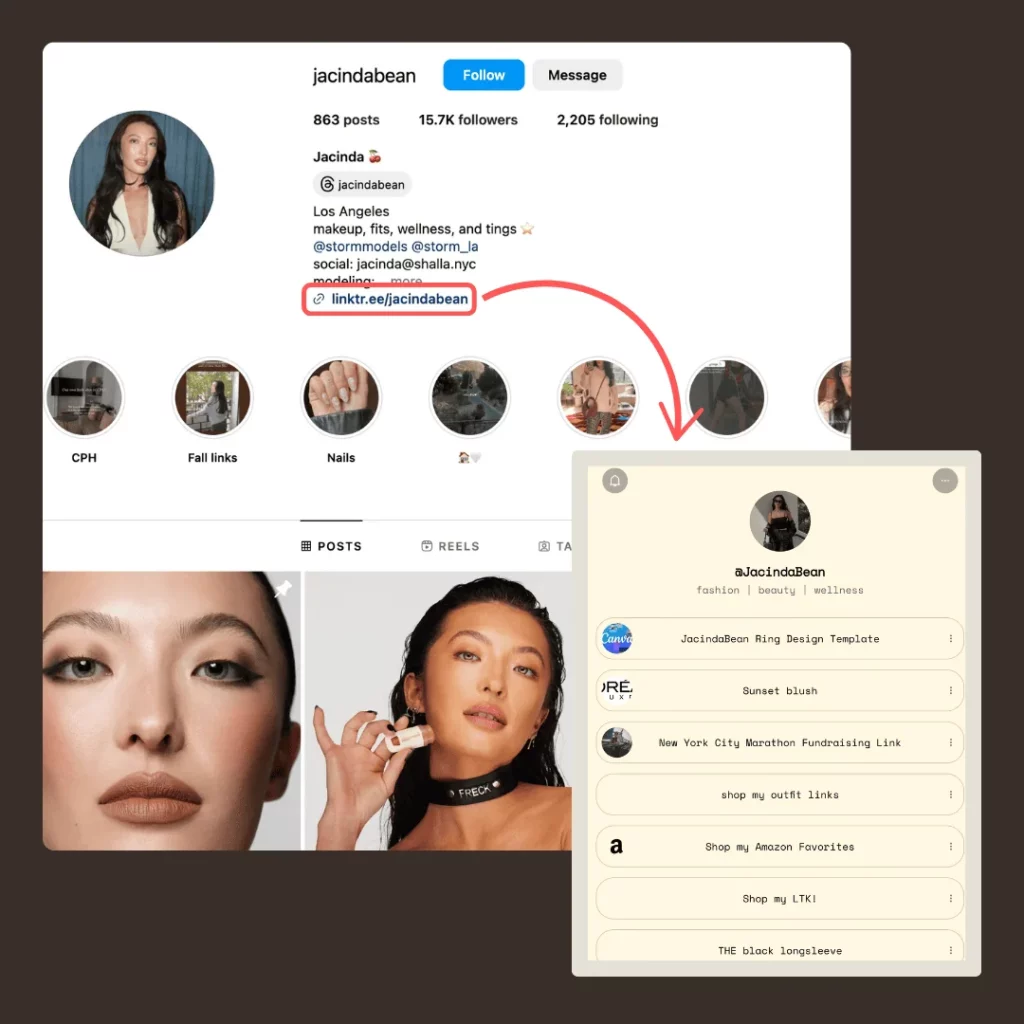
Coupon and Deal Sites
Coupon and deal websites help shoppers save money. They gather and promote discount codes, flash sales, and special offers from different brands. They appeal to users actively searching for ways to cut spending.
Here’s how these sites work with affiliate codes:
- Show active coupons and hot deals clearly on their websites. This will draw in buyers who watch their budgets.
- Send regular newsletters that highlight the latest discounts.
A well-known real-world example is RetailMeNot, one of the largest coupon and deal websites. It showcases many promotions from thousands of retailers across various industries.
RetailMeNot even features sections for specific brands. It shows affiliate codes, discount amounts, and expiration dates clearly.
 Email and Newsletters Affiliates
Email and Newsletters Affiliates
This type of affiliate attracts subscribers within a specific niche and keeps in touch through consistent emails or newsletters. They usually send updates based on a set schedule, typically once or twice per day, week, or month.
After email publishers join your affiliate program, they can use affiliate coupon codes in many types of email content, such as:
- Dedicated promotional emails that highlight key product benefits
- Regular newsletters that keep your offerings top-of-mind for engaged subscribers.
- Seasonal or holiday campaigns grab shoppers’ attention and promote fast buying.
A real example is Tim Ferriss. He sends out a popular weekly newsletter called 5-Bullet Friday. Each issue has five quick recommendations. They cover books, gadgets, travel tips, and personal insights. Occasionally, he shares exclusive discount codes with his subscribers for some of his favorite items.
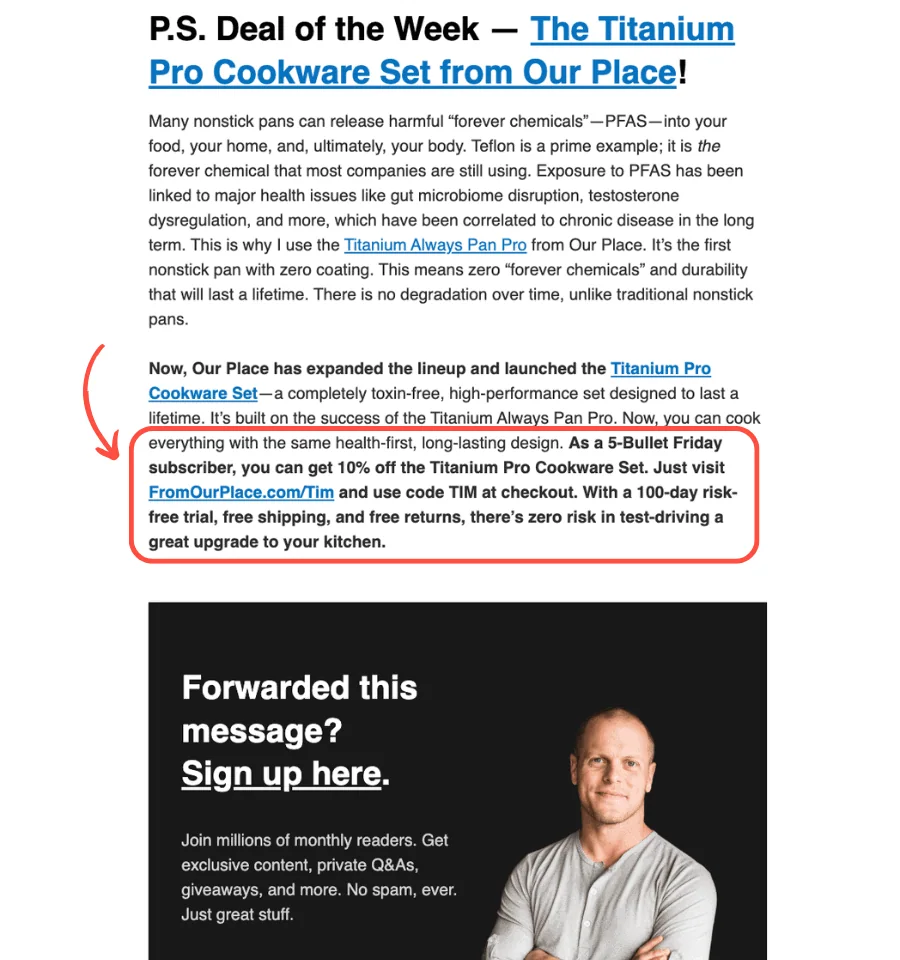
Podcasters
Podcasters produce online audio content that listeners can stream or download anytime. Their shows cover a wide range of topics. These include tech, business, health, entertainment, education, and niche interests.
Podcasts have grown in popularity in recent years thanks to their convenience and the ability to enjoy content while on the go. As skilled storytellers, podcasters can promote your brand and products in an authentic and engaging way.
Here’s how they often use affiliate codes in their shows:
- Talk about the products in the episode. Point out their main features or share personal stories. Then, mention the discount code.
- Add affiliate codes in the show notes so listeners can easily take action after the episode.
Take The Lavendaire Lifestyle, a podcast by Aileen Xu, as an example. Her episodes blend expert interviews with personal reflections around intentional living. From time to time, she recommends tools, books, or brands, along with exclusive discount codes for her audience.
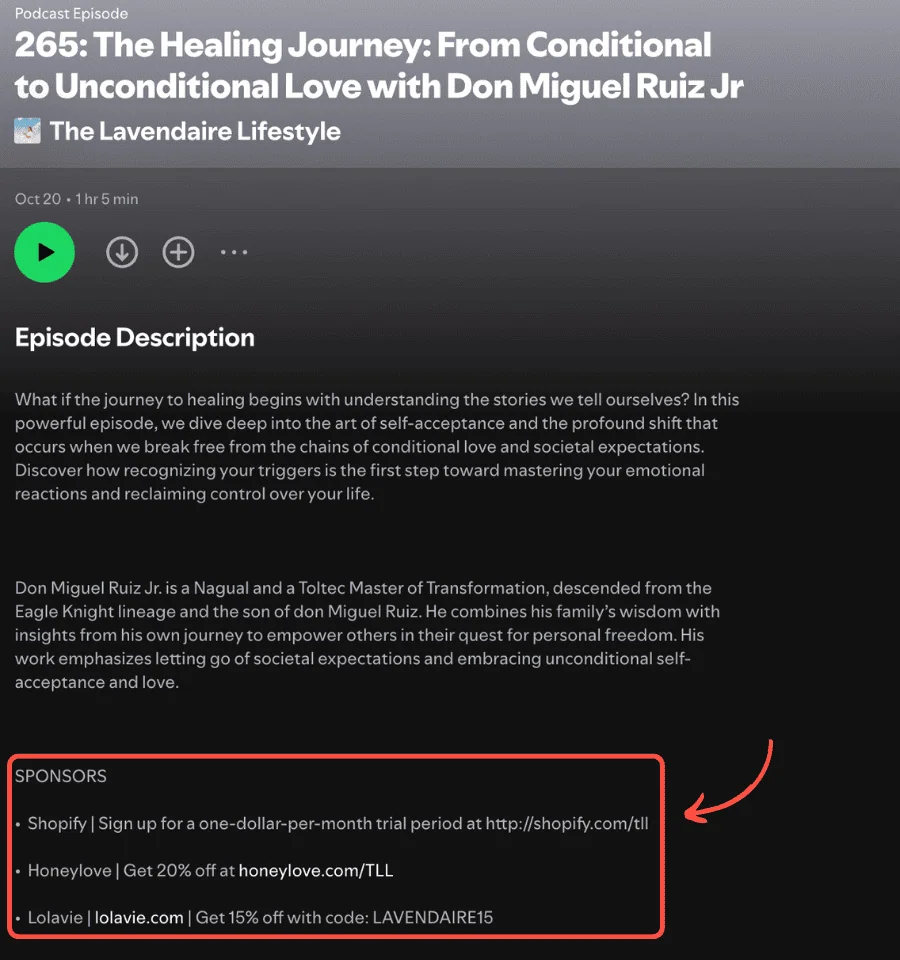
4 Strategies to Implement Affiliate Codes Effectively to Boost Sales
Implementing a successful affiliate code program requires strategic planning and execution. Here are four effective strategies to help you get the most out of your affiliate codes:
Auto-Generate Affiliate Coupon Codes to Save Time
Creating individual affiliate codes manually can quickly become overwhelming as your program grows in the number of affiliate partners. Implementing an automated system offers several advantages, such as:
- Consistency: Auto-generated codes have a steady pattern. This makes them easy to track and analyze.
- Error reduction: Automation reduces the risk of human mistakes in code creation and assignment.
That’s where affiliate tracking software that can automatically create and assign affiliate coupon codes comes in.
With UpPromote, you can track referrals using coupon codes instead of affiliate links and enable automatic coupon generation to save time.
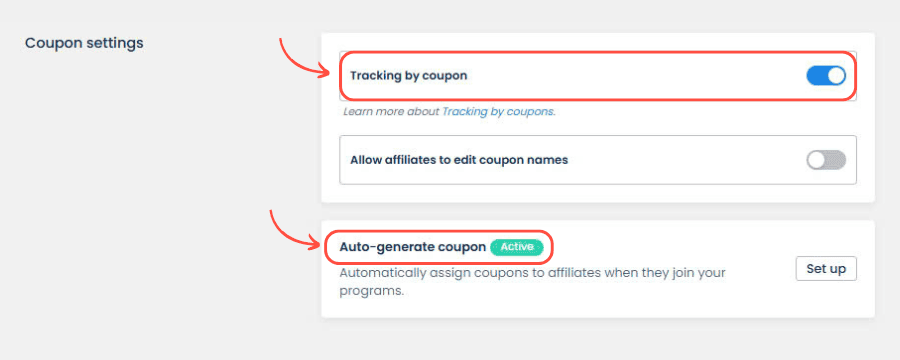
You simply select the program you want to generate affiliate coupons for, then choose a coupon name format to complete the setup.
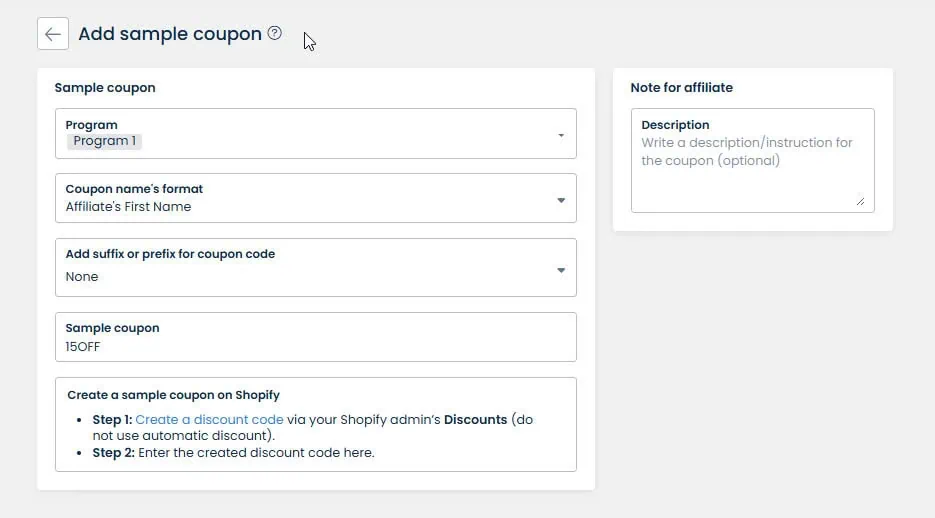
Provide Unique and Personalized Codes for Each Affiliate
Giving your affiliate partners a discount code when they join your program is a great way to support their promotional efforts and help them bring in more customers.
However, standard codes like SAVE10, SPRING20, or GET15OFF can feel a bit cold and impersonal when affiliates share them with their audience.
That’s why it’s a good idea to give each partner a custom coupon code. Personal codes come with some great benefits:
- Feel more personal: Including the affiliate’s name makes the code feel like it truly belongs to them.
- Easier to remember: People are more likely to remember a code that’s tied to someone they follow or trust.
- Better tracking: Unique codes make it easier to track each affiliate’s performance accurately.
Boohoo, the online fast-fashion brand, often shares exclusive coupon codes with their affiliates. These codes feature the affiliates’ names.
One of their partners is Millie Jane, a fashion and lifestyle influencer from the UK. She gets a unique code to share with her followers on social media. It can look like this:.

Providing a unique coupon code for each affiliate is simple when you choose the right affiliate management app. With UpPromote, it’s easy to set up. You can allow your affiliates to customize their coupon names to add a personal touch.
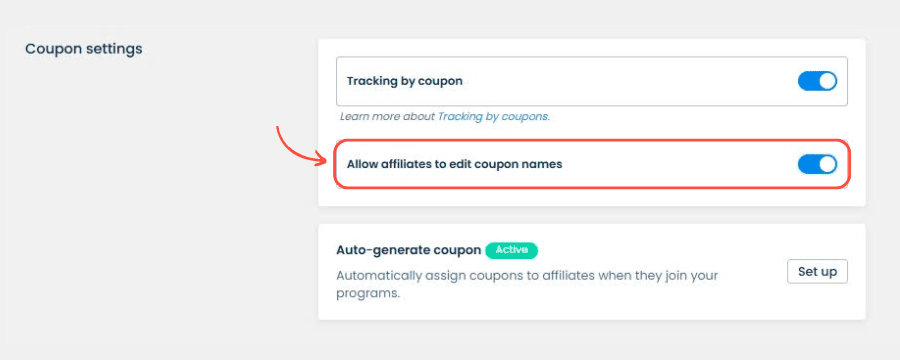
After you activate the feature, your partners can log in to their accounts. They can then adjust their assigned codes right from the affiliate dashboard.
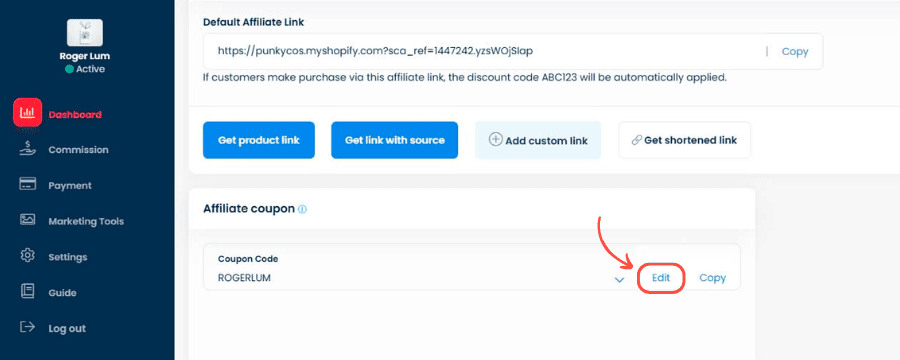
Empower your partners with exclusive codes that reflect their brand and inspire their followers to make purchases.
Leverage Peak Shopping Seasons to Offer Affiliate Discount Codes
Timing matters a lot in affiliate marketing. Seasons like Black Friday, Christmas, back-to-school, and summer sales are perfect for boosting sales. People often spend more during these times.
You can create special deals that only run during these busy periods. Exclusive, time-limited offers give your affiliates something exciting to share. They also help create urgency and give shoppers that extra push to make a purchase.
For example, fashion brand White Fox often takes advantage of peak shopping times to offer special affiliate codes. These codes offer deeper discounts to their publishers, influencers, and ambassadors, making it easier for them to engage better with their fans and drive more sales.

Closely Track and Analyze Affiliate Code Performance
Just giving affiliate codes to your partners isn’t enough. If you want long-term success, you need to keep an eye on how well each affiliate is doing with their code and keep improving your strategy to get better results over time.
You should set clear goals and KPIs to measure effectiveness. Focus on some key metrics, such as:
- Total sales generated by code: Total revenue generated from each discount code.
- Number of orders/ conversions: The number of purchases or conversions attributed to the code.
- Average order value (AOV): The average value of orders placed using the code.
- Conversion rate: The percentage of clicks or visits (if tracked via links/UTMs) that result in purchases using the code.
- New vs returning customers: The ratio of first-time buyers to returning customers using the code.
- Customer acquisition cost (CAC) per code: The cost to acquire each customer through the code, including commission and discount value.
- Redemption rate of code: The percentage of times the code is used versus how many were distributed (if limited).
- Time to first sale: The time from when the affiliate receives the code to when they generate their first sale.
To accurately measure these metrics, it’s important to use a reliable affiliate tracking software that gives you real-time data and clear reports.
With UpPromote, our app will offer a comprehensive suite of tracking methods. So you’ll understand your affiliate performance, like how many affiliates you have, how many orders they bring in, the commissions earned, and where referrals come from.
You can also see all this information visually, with easy-to-read charts, graphs, and tables.
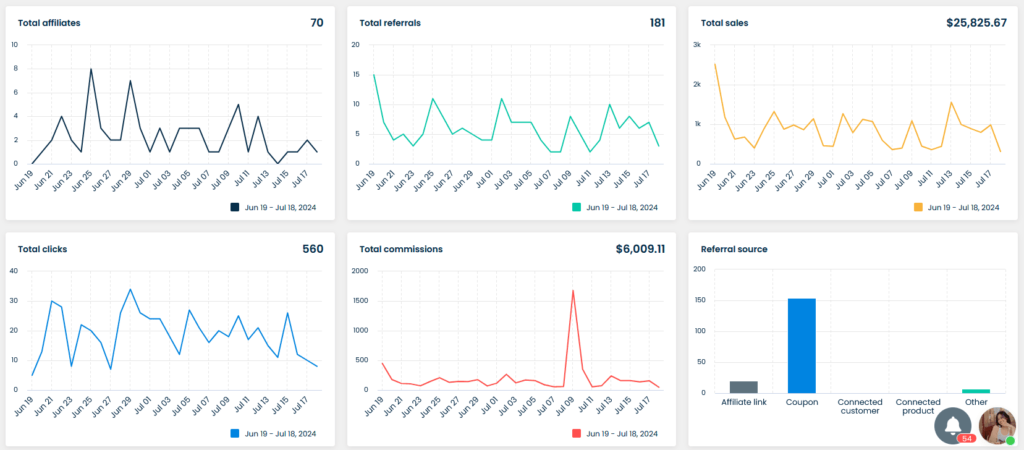
By tracking affiliate performance using discount codes, you can see what works and find areas to improve. Then, you can make data-driven decisions to optimize your campaign, such as:
- Resource allocation: Performance data helps you invest more in your highest-performing affiliates.
- Conversion optimization: Analysis reveals which discount amounts and code structures convert best.
- Affiliate motivation: Identify your best affiliates and reward them. Offer bonuses, gifts, or higher commissions to keep them engaged.
Final Words
Affiliate codes are a smart and flexible way for merchants to grow their business. These codes are simpler for customers to remember than traditional affiliate links. They also work well on different platforms. When used the right way, they not only boost sales but also help you build stronger connections with your affiliate partners.
The best affiliate code programs usually have a few things in common: personalization, automatic code creation, smart timing around big shopping events, and regular improvements based on real data. By incorporating these elements into your affiliate program, you create a system that benefits all parties involved—your business gains new customers, affiliates earn meaningful commissions, and consumers receive valuable discounts.


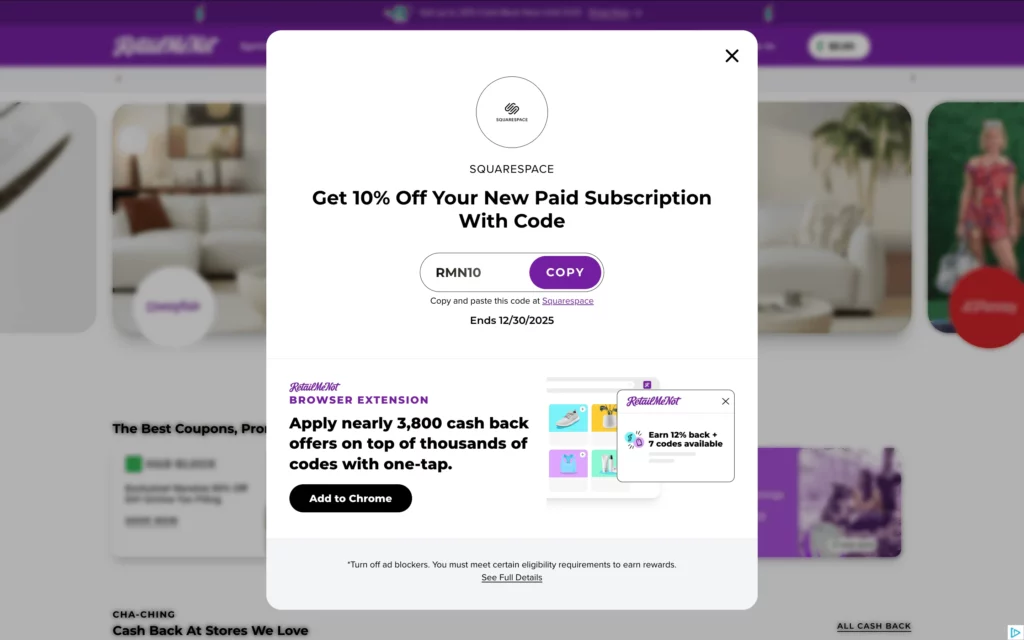 Email and Newsletters Affiliates
Email and Newsletters Affiliates


